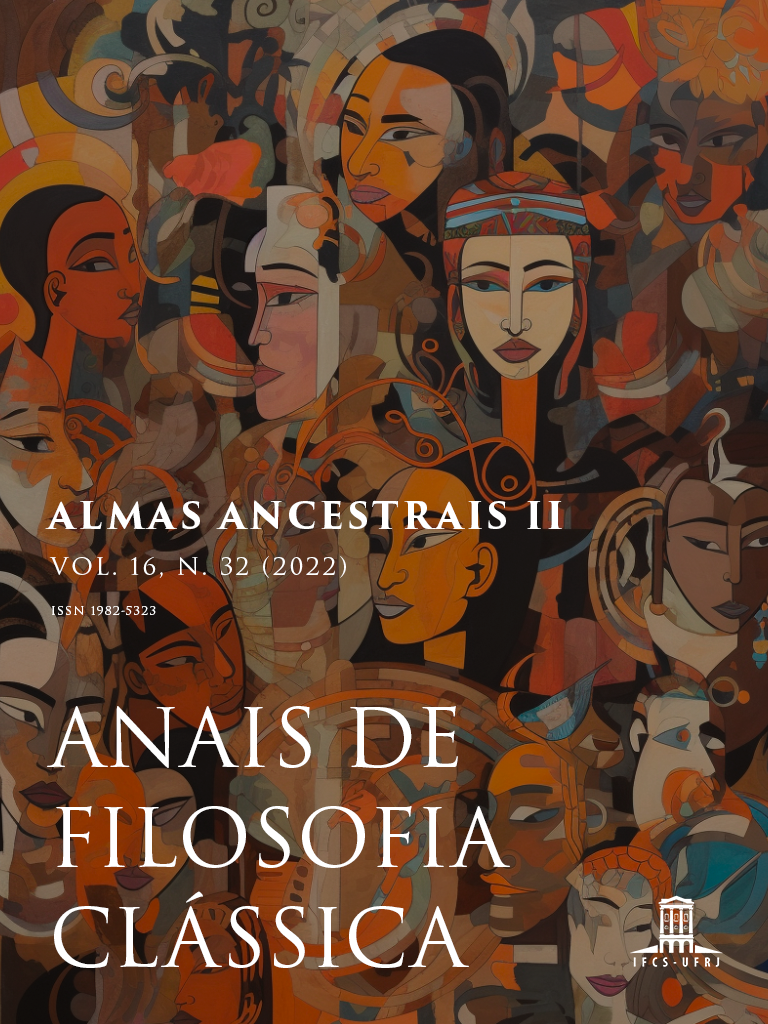Vol. 16 Núm. 32 (2022): Almas Ancestrais 2

O Volume 16, números 31 e 32 dos Anais de Filosofia Clássica, acompanha o Programa atual do Laboratório OUSIA para a investigação das Inteligências Ancestrais, lançado em 2022, com apoio do Instituto de Filosofia e Ciências Sociais da UFRJ e fomento da FAPERJ. Este programa visa a ampliar as fronteiras da Filosofia Clássica para outras zonas criativas de pensamento, nas quais as diferentes expressões dos saberes antigos se encontrem na diversidade. Esta ampliação de horizontes se projeta desde o número sobre as Mulheres Míticas e os números resultantes do Festival Dionisiaca e do simpósio sobre o Tempo na Antiguidade. As sabedorias órfico-dionisíacas expressas nas tragédias, os saberes das narrativas dos itans da tradição iorubá e outras formas de expressão tradicional trouxeram para uma zona crítica o conceito de Filosofia Clássica. A contínua lida com a Filosofia Pré-Socrática exigia cada vez mais este olhar transdisciplinar voltado para as expressões poéticas da sabedoria; e este olhar se desdobra na diversidade das culturas.
O número 32, que atrasou por força de mudanças no Portal de periódicos da UFRJ, completa o volume centrado na ancestralidade e diversidade cultural, onde tradições sapienciais milenares bebem em suas fontes antigas e instauram seus valores básicos. O artigo de Michele Lanza discute como a figura intelectual do filósofo grego é moldada sobre a personagem de Sócrates ao longo da Antiguidade, de Platão a Plutarco. O artigo de Roberta Paulo e Gérard Grimberg, mostra, de modo complementar, o estatuto do sábio na Grécia, anterior ao trabalho de delimitação do filósofo e da filosofia; e Hedgar Castro explora as origens das formas discursivas da filosofia grega desde a prática política da oratória, no Fedro de Platão. Carlos Eduardo Rocha e Rogério Athayde nos levam, em cada um de seus artigos, para outro território da Antiguidade, traçando questões sobre as práticas e valores sapiencias de Ifá na tradição iorubá, que envolvem de modo direto a transmissão geracional da sabedoria e seus ritos próprios de celebrar o nascimento e respeitar a ancianidade. Francisco de Oliveira retoma, a partir de Agostinho, a questão da fé e do conhecimento, presente onde se encontram as fronteiras das religiões com as respectivas experiências de sabedoria.
Este número traz também a tradução comentada por Verônica Filippovna do apêndice sobre o Menadismo no clássico The Greeks and the Irrational.

